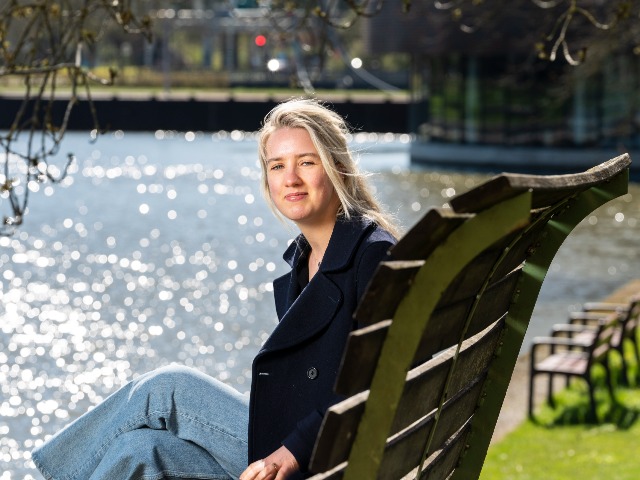Bridging the gap in the labor market: studying (and challenging) gender stereotypes
Date:15 August 2023
Aukje Nieuwenhuis received the Jan Brouwer Thesis Award from the Royal Holland Society for Sciences and Humanities (Koninklijke Hollandsche Maatschappij der Wetenschappen, KHMW) earlier this year for her master’s thesis. Her thesis, titled...
Hydrogen: high technical potential, but with economic challenges
Date:08 August 2023
Professor of Energy Economics Machiel Mulder was appointed as a member of the Scientific Climate Council by the Dutch Ministry of Economic Affairs and Climate Policy this April. As experts in relevant fields, Mulder and his fellow council members will advise the government on climate policy. We talked to Mulder about his research on the economics of the energy transition, in particular the economic value of hydrogen, hydrogen’s potential role in the energy transition and the importance of accelerating this transition.
New in Groningen: Edlira Shehu
Date:26 July 2023
Edlira Shehu recently joined the Faculty of Economics and Business as Professor of Digital Marketing. Before coming to Groningen, she worked at universities in Germany and Denmark. Having also worked in the industry in different management positions in the field of marketing analytics, Shehu brings a lot of practical experience to the table. She knows how to bridge the knowledge gap between academia and practice with her research focused on the challenges and opportunities of digital marketing. Shehu often collaborates with industry partners and aims to help organizations improve their marketing activities with state-of-the-art methods. Having collaborated with colleagues from Groningen’s Department of Marketing before, she felt her research profile fits well within the department. So, at the start of 2023, she made the move.
Studying the up- and downsides of virtual meetings on board decision making
Date:20 June 2023
During the COVID-19 pandemic, we were all confronted with a new model of holding virtual meetings. We struggled with the limitations of such meetings, while at the same time, we also saw some of the opportunities these meetings might have. Professor of International Finance Niels Hermes, together with Dennis Veltrop (Associate professor of Corporate Governance at FEB) and Trond Randøy (Copenhagen Business School), decided to study the consequences such meetings may have for meetings of boards of large companies and the quality of their decision making. In this blog, he shares their findings and discusses what they might mean for the future of board meetings and decision-making processes.
Interdisciplinary PhD’s: “enabling precise scientific input and professional collaboration”
Date:08 June 2023
Innovative research is often a collaborative effort between multiple disciplines. In the past year, several PhD candidates have started interdisciplinary projects that are a collaboration between the Faculty of Economics and Business and other faculties of the University of Groningen. Tamool Muhamed is one of them. In her project on child health outcomes in targeted socioeconomic status groups, she works together with researchers from FEB’s Economics, Econometrics, and Finance department and the University Medical Center Groningen.
Instruments to generate better, less egoistic, workplaces
Date:01 June 2023
Assistant professor of Accounting Lucia Bellora-Bienengräber recently received the Honor Roll of Responsible Research in Business and Management together with two colleagues from Clemson University in the US. They received the award for their paper focused on how ethically focused management control systems influence counterproductive work behaviors and work climate. FEB Research talked to Bellora-Bienengräber about the study and the importance of finding instruments to generate better workplaces.
New in Groningen: Ulrike Schultze
Date:11 May 2023
Ulrike Schultze recently joined the Faculty of Economics and Business as Professor of Business Information Systems. Before coming to Groningen, Schultze worked at the Southern Methodist University in Dallas for 25 years. She decided to make the move to be closer to family again, but also expected to feel at home in Groningen’s academic environment. She likes her new department Innovation Management and Strategy, for its interdisciplinary approach to research. This interdisciplinary approach is key when focusing on the application of information technology and its implications for work and social life, as Schultze does.
Can digitization bridge the healthcare gap?
Date:13 April 2023
Currently, about 16% of the workforce in the Netherlands works in healthcare. These include doctors, nurses, caregivers, and therapists. Together, they provide care in the form of hospital care, mental health care, nursing care, home care, care for disabled people, and youth care. In 2023, the total demand for care is expected to be around 100 billion euros. Experts expect this demand to increase sharply in the coming years. This is due to an aging population, more chronically ill people, and new medical options.
Diversity does not automatically lead to inclusion: how can organizations improve their policies?
Date:04 April 2023
Kyra van Hinsberg, a PhD candidate at FEB, researches the experiences of women in senior management positions. In this blog, she will explain how focusing on diversity without considering inclusion can inhibit positive outcomes of diversity policies and will provide some pointers for how organizations can improve the effectiveness of their diversity practices.
New insights into the deep cultural roots of entrepreneurship
Date:13 March 2023
Second-generation immigrants are more likely to become entrepreneurs if their parents originate from countries characterized by a strong entrepreneurial culture than second-generation immigrants whose parents stem from countries characterized by a weak entrepreneurial culture. This is what new research by Johannes Kleinhempel, Mariko J. Klasing and Sjoerd Beugelsdijk argues. Their study was recently published in Organization Science. In this blog, the authors will give a summary of their most important findings.











